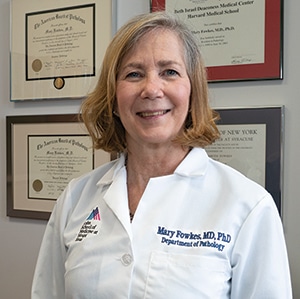Mary E. Fowkes, MD, PhD (1954–2020)
January 2021—Mary E. Fowkes, MD, PhD, a member of the CAP Board of Governors since 2019, died on Nov. 15, 2020.
Dr. Fowkes was an associate professor of pathology and the director of neuropathology and the autopsy service, Icahn School of Medicine at Mount Sinai Hospital. She was also an adjunct professor at the State University of New York College of Environmental Science and Forestry in Syracuse.
Dr. Fowkes served on many CAP committees and councils. She had been most recently appointed vice chair of the Council on Education and a member of the Council on Scientific Affairs and the Finance Committee. Dr. Fowkes was a former president of the New York State Society of Pathologists.
Kathryn T. Knight, MD, medical director of women’s health services and cytopathology, PathGroup, Nashville, met Dr. Fowkes after joining the CAP Federal and State Affairs Committee (FSAC) in 2004. “We’ve had a friendship that has lasted since that time,” she says, describing her friend as “incredibly committed and caring.”

Dr. Fowkes
(Photo: Mount Sinai Health System)
Dr. Fowkes was “absolutely passionate” about the value of the autopsy, Dr. Knight says, but her advocacy work at the federal and state levels went beyond the autopsy. When lawmakers in New York passed a bill banning pathologists from discussing laboratory and pathology test results with patients, “Mary was right there leading the charge to prevent that from taking place.”
“She was willing and able to participate whenever she could assist.”
Of Dr. Fowkes’ autopsy work, she says: “It’s telling that the things that she was so passionate about, this particular year, put her in front of the COVID-19 battle. From the beginning of the pandemic, she was out there doing autopsy after autopsy and helping us understand, as pathologists and as physicians, not only the initial impression of lung damage and the impact on the pulmonary system, but the multisystemic impact of COVID-19.”
In a 60 Minutes interview that aired a week after her death, Dr. Fowkes told interviewer Anderson Cooper that the autopsy was the most useful tool for learning how the virus affected patients. She described finding small and microscopic blood clots in the lungs, hearts, and livers—and significant blood clots and signs of stroke in the brains—of COVID-19 victims.
“She improved the opportunities for survival for patients, even in this relatively short period of time, simply by shining a light on what this disease was doing,” Dr. Knight says. “She put so much of herself into her efforts to help us understand the disease.”
“Here is someone who has steadily said, ‘The autopsy is necessary for us to understand disease, to understand treatment.’ And during the last period of her life, everything she has been preaching, so to speak, came to fruition and gave her this, in many ways, unwelcome platform, but nevertheless a platform to prove the point,” Dr. Knight says.
 CAP TODAY Pathology/Laboratory Medicine/Laboratory Management
CAP TODAY Pathology/Laboratory Medicine/Laboratory Management
